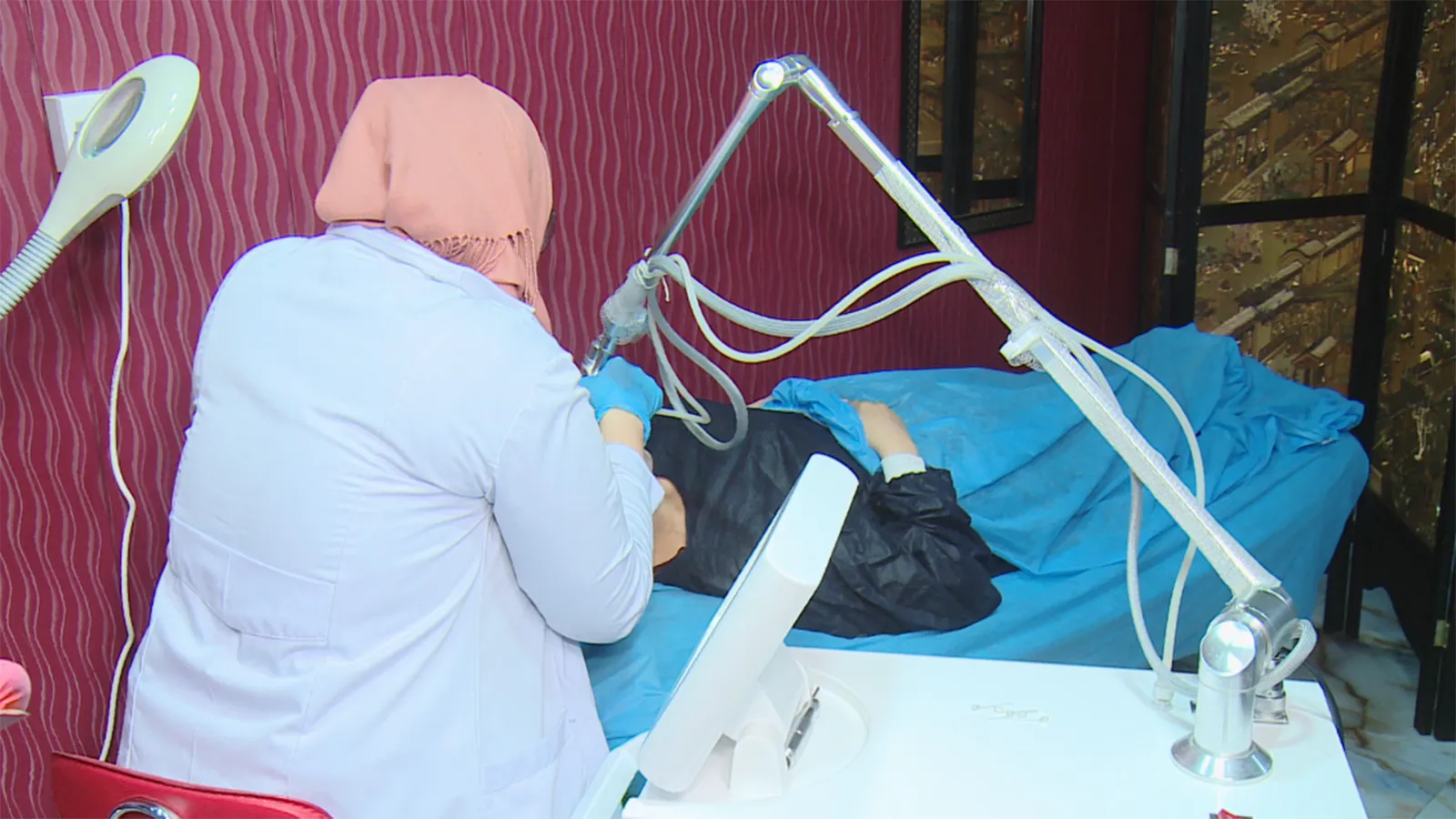Iraq's beauty industry: nightmare or dream for Iraqi women?

Shafaq News / Alia, 25-year-old, entered a beauty center in Baghdad with optimism about enhancing her appearance. Spotting someone in a white coat, she placed her trust in them. Her choice of the center was primarily due to its affordability. Such scenarios unfold daily despite numerous warnings about the risks associated with plastic surgery.
In a world filled with images of perfect beauty, cosmetic surgery has become an obsession for many women. They chase an illusion of perfection, often overlooking the health risks involved. This is especially true when they seek out cheap procedures at unlicensed clinics, tempted by the promise of affordability. However, these bargain-basement surgeries can have devastating consequences, sacrificing both health and beauty.
Alia's Story
The allure of low prices at unofficial clinics is a siren song for many women seeking a shortcut to beauty. But behind the facade of these facilities lie countless tragedies – stories of complications and permanent disfigurement. Alia's experience exemplifies this danger. Her quest for beauty in Baghdad, far from her home in Babil, became a horrifying nightmare.
Alia told Shafaq News Agency that she came to Baghdad upon advice from her friend telling her about her experience at a beauty center in Baghdad at a low cost, so she decided to travel for a filler injection to get a "more beautiful face."
At first, things were going normally, but after she returned to Babil, she soon began to show painful complications, such as inflammation of the face, high body temperature, and others. She returned to Baghdad to contact the doctor who operated, but it turned out that the doctor was not specialized and the center was not official; after inquiry and communication with the health authorities, they confirmed that her case was not the first, but many women have fallen victim to these centers.
Cosmetic Centers In Baghdad
In Iraq, there is a large number of unregistered cosmetic centers. The latest official statistics from the Ministry of Health indicate that registered centers nationwide are at most 100. However, in Baghdad alone, there are more than 500 centers, excluding the rest of the governorates, according to Head of the Doctors Syndicate, Dr Hassenein Safa Shubar.
Shubar adds to Shafaq News Agency, "There are also large numbers of individuals impersonating doctors who practice medical procedures, especially cosmetic ones such as fillers and Botox, which are highly sought after by citizens."
Shubar points out that "these centers employ both men and women and are owned by investors and businessmen, sometimes serving as covers for money laundering and other activities. Despite this, the effort directed towards this issue remains insufficient, and the responsibility exceeds that of the Medical Association and even the Ministry of Health. It is primarily a security responsibility related to economic security and organized crime, requiring a comprehensive governmental approach due to its seriousness and scale."
He emphasizes that "anyone addressing this issue faces political, social, tribal, and other pressures because these centers are funded in one way or another by individuals with societal connections and extensions."
"The fundamental problem resulting from this issue is Law No. 25 of 2015 on Health Institutions, which allows any citizen, regardless of being a doctor or not, to submit an application to the Ministry of Health to establish a health institution, thus becoming an investor. Consequently, any person, even if uneducated, can open a hospital, leading citizens to receive treatment at institutions managed by individuals with no relation to medicine or science, neither closely nor remotely, as a result of the passing of this law in a peculiar manner in 2015."
Shafaq News attempted to contact the Iraqi Ministry of Health to inquire about the number of fake beauty centers that have been closed, the number of individuals impersonating doctors in Baghdad and the governorates, and the ministry's plan to curb this phenomenon that threatens the health of citizens. However, it has yet to receive a response to these inquiries at the time of writing this report.
Legal Approach
Legal expert Ali Al-Tamimi explained the legal penalty for impersonation in Iraqi law, stating that "Article 1/1 of Law No. 160 of 1983 punishes this crime with imprisonment for ten years. It considers material gain as an aggravating circumstance that allows the Criminal Court to increase the penalty in accordance with Article 136 of the Penal Code. This law amends Articles 260, 261, and 262 of the Penal Code, which previously punished this crime with imprisonment for no more than five years and a fine. This action was considered a misdemeanor, but it became a crime under Law No. 160 of 1983."
Al-Tamimi adds to Shafaq News Agency, "This crime is one of the compound crimes that are dominated by fraud and impersonation, as it is aggravated in the case of impersonating the security services, and it is fraud and fraud in the case of impersonating a doctor or lawyer, etc. for this reason the legislator stiffened the punishment, as it leads to a loss of confidence in government agencies and fear in public dealing."
He points out that "the opening of beauty centers by doctors without official approvals, in this case, they are referred to the Discipline Committee of the Doctors Syndicate, and the penalty may reach the prohibition of practicing the profession and removal from the list of doctors, but if the person who opens this center is not a doctor, in this case, we are facing impersonation according to Law 160 of 1983, where the penalty reaches ten years in prison."
Al-Tamimi emphasizes that "these crimes have increased with electronic blackmail and money extortion, and they require intelligence efforts and the cooperation of the public with the security services to reach these criminals."





